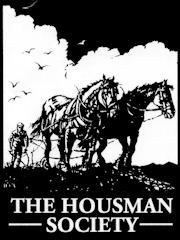A Shropshire Lad
|
Key: V: Textual Variation. C: Commentary. Q: Question. Glossary
ASL XXXVIII “The winds out of the west land blow”
Top ▲ Glossary
| Line | Word | Glossary |
| 3 | forelock | A lock of hair that grows or falls over the forehead (To “tug the forelock” is to acknowledge a superior) |
| 16 | hollo | Call out |
| 18 | abode | A short sword worn on a belt |
Top ▲ Commentary
| Line | Commentary |
| Date: Oct – Dec 1895 | |
| meter | Four line stanzas of alternating eight and six syllables, (iambic quatrameter / trimeter) rhymed alternately |
Top ▲ Variations
| Line | Text | Textual variation |
| 1 | D1d1 | winds] wind<s> blow] blow<s> |
| 2 | D1d1 | them] it |
| 3 | D1d1 | And [?sent] → And at my ear the speech it knows |
| 4 | D1d1 | Fly silent \ [?sighing] [?swelling] / on the air → I [?] on the air |
| 5 | D1 | fanned] <stroked> temples] <faces> |
| 6 | D1 | And from their <lips> \ mouths / flew free, \ Scattered their forelocks free, / |
| 7 | D1 | My friends] And they |
| 8 | D1 | talk] say |
| 9 | D2 | dying as they fly,] <perished to a sigh> |
| 10 | D2 | Loose on] <Along> \ Thick on / Thick on is used in all editions before Nov 1922 |
| 10 | D2 | wind] \ gale gusts / |
| 11 | D2 | blow soundless] go <silent> \ soundless / |
| 12+ | D2 | Additional two lines: So far the east is from the west | The wind has lost the word |
| 13 | D2 | Oh] My |
| 18 | D2 | abode] could stay |
| 20 | D1 | sigh] <meet> |
| 20 | D2 | road] way |
Top ▲ Questions
| Line | Question |
| 1 | Why does the poet change from “wind” to “winds” from the draft to the final version? |
| 4 | Why is the air described as “sighing“? |
| 5 | What is the difference in mood between stroked their faces in the draft and fanned their temples in the final version? |
| Whole poem | What evidence can you find from the poem as a whole that the poet links the winds with words and poetry itself? |
| Whole poem | How does this poem fit with the others that consider the physical and emotion distance away from ‘Shropshire’ for the narrator in this phase of the collection? |
